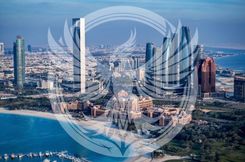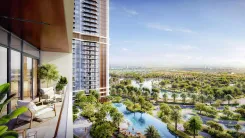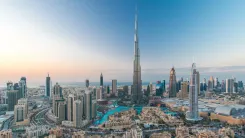The deserts of Dubai have long been synonymous with luxury and ambition. Today, they are experiencing a surge in a different kind of gold rush – a real estate boom that has seen property values soar and investor confidence skyrocket. After facing a period of stagnation due to the COVID-19 pandemic, the UAE's real estate market, particularly in Dubai, has undergone a remarkable turnaround. This article delves into the reasons behind this growth, analyzes current market trends, explores expectations for the next 12 months, and examines potential challenges and opportunities within this dynamic sector.
From Slump to Soar: A Post-Pandemic Recovery Tale
The COVID-19 pandemic hit the UAE's real estate market hard. Lockdowns, travel restrictions, and economic uncertainty led to a decline in investor confidence and a decrease in property transactions. Rental rates plummeted, and property values stagnated or even declined in some areas. However, the UAE government's swift and decisive response proved pivotal in setting the stage for a rapid recovery.
A key driver of this rebound has been the successful national vaccination program. This, combined with a return to normalcy in business and travel activities, has boosted investor confidence and fuelled the demand for property in the UAE. Additionally, the government implemented various economic stimulus packages, providing much-needed support to businesses and individuals during the pandemic.
Data Unveiling the Boom: Numbers Speak Volumes
Market data paints a clear picture of the UAE's resurgent real estate market. According to Mordor Intelligence, the UAE residential real estate market is projected to register a Compound Annual Growth Rate (CAGR) exceeding 8% during the 2022-2027 period. This significant growth signifies a robust recovery from the pandemic's effects.
Global Property Guide further corroborates this trend. As of Q1 2024, apartment prices in Dubai surged by an impressive 20.43% year-on-year, while villa prices experienced a similar rise of 22.08%. This growth is significantly higher compared to the previous year's figures, indicating an acceleration in the market. Transaction volumes have also witnessed a significant increase, reflecting a healthy demand for property across various segments.
The Winds of Change: Factors Propelling Growth
Several key factors are contributing to the UAE's real estate market resurgence:
- Government Reforms: The UAE government has implemented various initiatives to stimulate the real estate market. These include:
- Visa reforms: Designed to attract foreign investment by offering long-term residency visas and streamlined application processes.
- Relaxed property ownership regulations for expats: Encouraging foreign residents to invest in property by simplifying ownership rights.
- Attractive investment programs: Like Dubai's Golden Visa, which grants residency for a period of 10 years in exchange for investment in property.
- Infrastructure development: Government spending on infrastructure projects like Dubai's Metro expansion and the construction of new airports further enhances the appeal of the UAE as a vibrant and well-connected location.
- The Power of Expo 2020 Dubai: This global event served as a major catalyst for the real estate market. It showcased the UAE's potential as a business and investment hub, attracting international attention and driving demand for rental properties.
- A Haven of Stability: The UAE enjoys a reputation for political stability and security in a region often marked by volatility. This stability serves as a major draw for investors seeking safe havens for their capital. Additionally, the UAE's strategic location, connecting East and West, further enhances its attractiveness to businesses and investors worldwide.
- A Flourishing Tourism Sector: The UAE's tourism industry has witnessed a significant rebound, with visitor numbers steadily increasing. This renewed interest in tourism translates to a higher demand for hotel space and vacation properties, further bolstering the real estate market.
Market Dynamics Shaping the Future Landscape
While the UAE's real estate market is demonstrably on an upward trajectory, certain trends are shaping its future:
- The Rise of Off-Plan Investments: Investors are increasingly drawn to off-plan properties, which offer the potential for higher returns upon completion. This trend reflects confidence in the market's continued growth. However, careful due diligence and a thorough understanding of project timelines are crucial before investing in off-plan properties.
- Focus on Sustainability: There's a growing emphasis on sustainable development within the real estate market. Developers are incorporating green building practices and energy-efficient technologies, catering to environmentally conscious investors and residents. This trend is likely to gain further momentum in the coming years, as sustainability becomes a key consideration for both developers and buyers.
- Emerging Property Markets: Dubai remains the epicentre of the UAE's real estate market. However, other emirates, such as Sharjah and Abu Dhabi, are witnessing increased investor interest due to their affordability and attractive investment propositions. These emerging markets offer potential opportunities for investors seeking value and diversification. Additionally, specific areas within Dubai, like Jumeirah Village Circle (JVC) and Dubai Silicon Oasis (DSO), are experiencing a surge in demand due to their family-friendly environment and proximity to key business districts.
- Shifting Demographics: The UAE's population is becoming increasingly diverse, with a large number of young professionals and families seeking to relocate to the country. This demographic shift is driving demand for smaller, more affordable apartments and townhouses, particularly in areas with access to good schools and amenities.
- The Rise of PropTech: Technology is playing an increasingly important role in the UAE's real estate market. PropTech platforms are transforming how properties are searched for, bought, and managed. These platforms offer greater transparency, efficiency, and convenience for both buyers and sellers.
A Glimpse into the Crystal Ball: Expectations for the Next 12 Months
Market analysts project the UAE's real estate market to maintain its upward trajectory over the next 12 months. However, a degree of cautious optimism is warranted. Factors like global economic fluctuations and rising interest rates could potentially impact the pace of growth. Here's a breakdown of some key expectations:
- Continued Price Increase: While the current surge might moderate, property prices are expected to continue rising at a steady pace over the next year. However, the rate of increase might not be as dramatic as the one witnessed in the past year.
- Increased Transaction Volume: Demand for property, both for residential and commercial purposes, is expected to remain strong. This will likely translate to an increase in transaction volume, indicating a healthy and active market.
- Shifting Market Dynamics: The market might witness a shift towards more end-user purchases, with people looking for properties to live in rather than solely for investment purposes. This could potentially stabilize prices and create a more balanced market ecosystem.
- Evolving Investment Strategies: Investors might adopt more diversified strategies. This could include a mix of off-plan and completed properties, as well as exploration of emerging property types like co-living spaces, student accommodation, and senior living facilities. These niche markets offer enticing investment opportunities for those seeking alternative avenues for capital appreciation.
Challenges and Considerations: Navigating the Golden Sands
While the outlook for the UAE's real estate market remains positive, some challenges require consideration:
- Affordability Concerns: Rapid price increases can potentially push property ownership out of reach for some segments of the population. The government might need to implement measures to ensure affordability and cater to the needs of middle-income earners. This could involve initiatives like providing government-backed mortgages or introducing affordable housing projects.
- Interest Rate Fluctuations: Rising interest rates could dampen investor enthusiasm and impact mortgage affordability. Potential buyers should be mindful of these factors while making investment decisions. Careful planning and analysis of personal financial situations are crucial before taking on mortgage debt in a rising interest rate environment.
- Overheating Risks: Maintaining a sustainable growth trajectory requires careful management. Overheating the market could lead to a future correction. The government and developers need to work together to ensure responsible growth. This may involve measures like regulating the pace of new development projects and monitoring market trends to prevent speculation.
- Supply Chain Disruptions: Global supply chain disruptions could potentially impact the construction of new properties, leading to delays and cost increases. Developers and investors need to be aware of these potential challenges and plan accordingly.
Conclusion: A Sustainable Future for Dubai's Golden Sands
The UAE's real estate market has demonstrated remarkable resilience, bouncing back from the pandemic with renewed vigour. Supported by various factors, including government initiatives, economic stability, and a thriving tourism sector, the market is poised for continued growth over the next 12 months. However, a focus on sustainable development, affordability, and responsible market practices is crucial to ensure long-term success.
Investors and potential buyers alike should conduct thorough research, adopt a cautious yet optimistic approach, and consider the evolving market dynamics as they navigate the dynamic landscape of the UAE's real estate market. This vibrant sector, with its potential for high returns, promises to remain a key contributor to the UAE's economic prosperity for years to come. By embracing responsible practices and innovation, the UAE can ensure that the golden sands of its real estate market continue to shine brightly.
The UAE's real estate market has experienced a dramatic resurgence following a pandemic-induced slump.
Fueled by government reforms, a robust tourism sector, and rising investor confidence, property values have surged in Dubai and beyond.
This article delves into the key factors driving this boom, analyzes current market trends, and explores potential challenges.
We look at the rise of off-plan investments, the growing focus on sustainability, and the emergence of new property markets in emirates like Sharjah and Abu Dhabi.
While the next 12 months are expected to see continued growth, concerns around affordability and interest rate fluctuations remain. By navigating these challenges and fostering responsible development, the UAE can ensure a sustainable and prosperous future for its golden sands.






